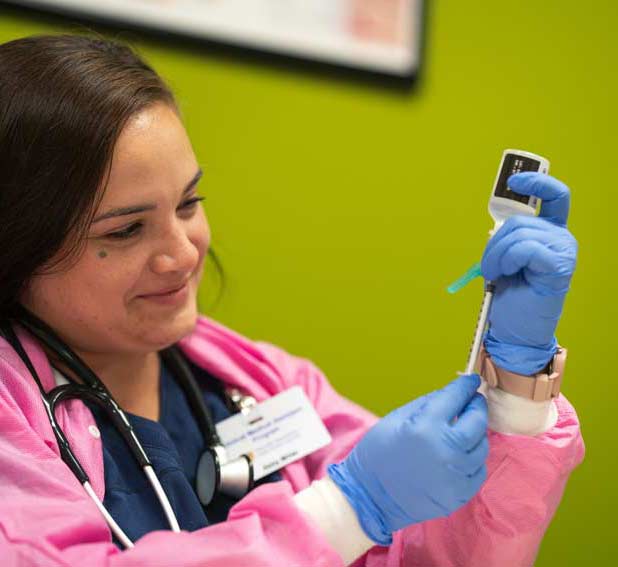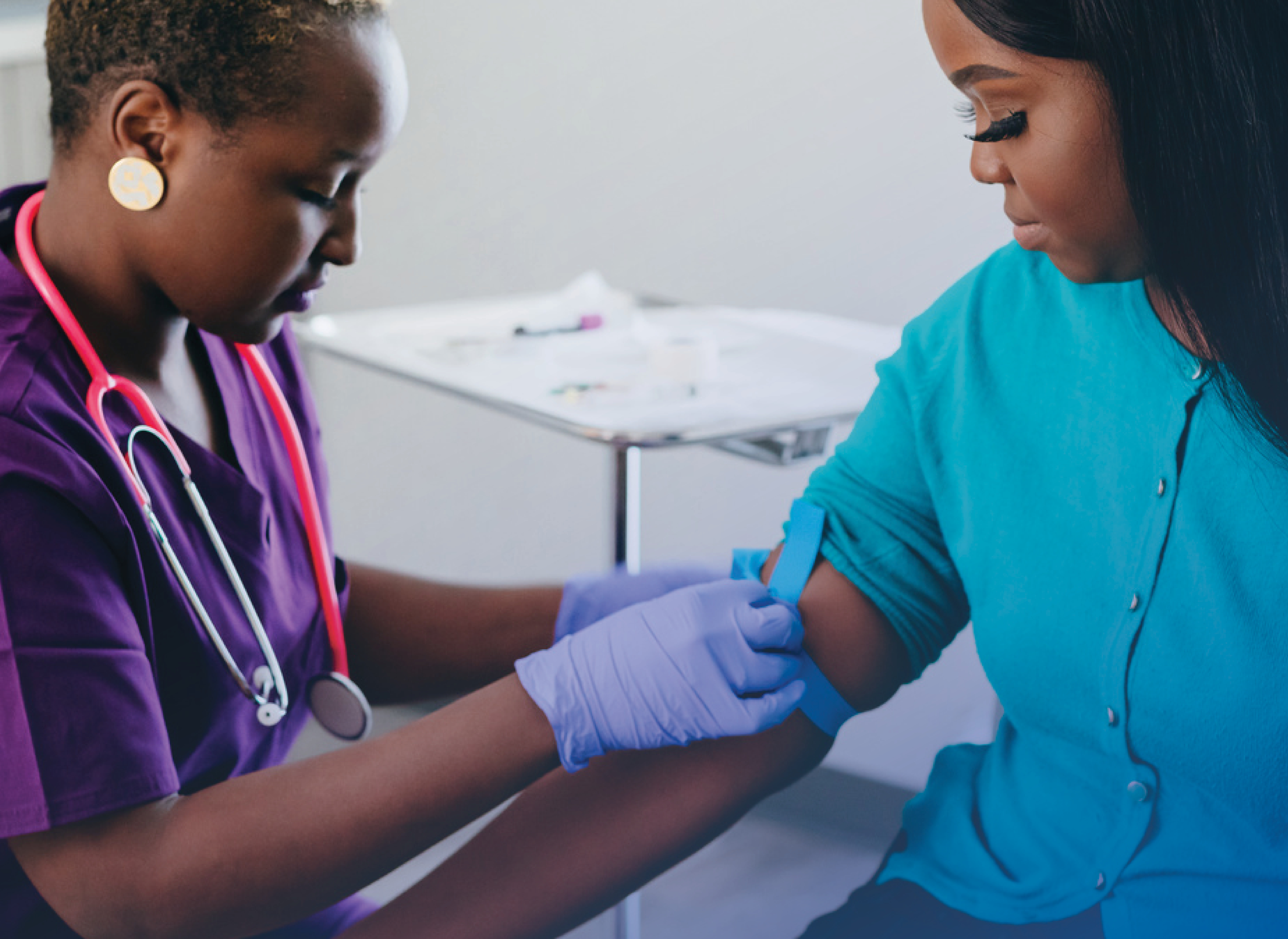What No One Tells You About Phlebotomy Classes Near Me
What No One Tells You About Phlebotomy Classes Near Me
Blog Article
The Path to Accreditation: Recognizing the Phlebotomy Educating Training Course Trip and Its Relevance
As you take into consideration the course to accreditation in phlebotomy, it's essential to understand the role you'll play in medical care. Your training will certainly cover necessary abilities, from blood collection strategies to patient communication.

The Role of Phlebotomists in Medical Care
Phlebotomists play a necessary function in the healthcare system, serving as the essential link between people and important diagnostic screening. You'll perform blood draws, guaranteeing samples are gathered accurately and securely. Your know-how helps in diagnosing clinical conditions, keeping an eye on wellness, and directing therapy choices.
In your everyday communications, you'll need to develop trust fund with clients, making them really feel comfortable during what may be a difficult experience. You're liable for identifying and taking care of samples very carefully to avoid contamination or mistakes, which can affect test outcomes.
Yet, you'll frequently function along with doctors and nurses, interacting crucial info concerning patients' conditions. Your function is basic in keeping the process in medical care settings, guaranteeing timely and exact outcomes. By mastering your abilities, you add meaningfully to patient care, making you an indispensable part of the medical team. Embracing this responsibility is crucial to your success as a phlebotomist.
Introduction of Phlebotomy Training Programs
When discovering phlebotomy training programs, you'll discover numerous kinds developed to fit different routines and finding out designs. Each program aids you develop important skills like blood collection and client interaction. Comprehending these choices is crucial to selecting the ideal path for your occupation.
Sorts Of Training Programs
Several types of training programs are available for those looking to end up being skilled in phlebotomy. In addition, some medical facilities and facilities offer on-the-job training programs, supplying sensible experience while you learn. Whatever path you pick, each program intends to equip you with the required abilities for an effective phlebotomy career.

Secret Abilities Created
Mastering phlebotomy requires a set of essential abilities that are created via extensive training programs. You'll discover technological skills like proper capillary option, needle insertion, and blood collection techniques. These hands-on techniques assure you can execute treatments securely and successfully. In addition, interaction abilities are basic; you'll require to connect with patients, explain procedures, and put them secure. Recognizing makeup and physiology is essential, too, as it aids you situate blood vessels and understand the body's response to blood draws. You'll acquire understanding of security protocols and infection control, assuring you maintain a clean and sterile atmosphere. Each of these abilities is necessary for your success as a licensed phlebotomist, making you a useful possession in any healthcare setup.
Trick Parts of a Phlebotomy Program
In a phlebotomy program, you'll concentrate on vital topics that lay the groundwork for your future job. You'll take part in hands-on training that allows you to use what you've found out in real-world settings. Both the curriculum and sensible experience are essential for your success as a phlebotomist.
Curriculum Summary
While pursuing a phlebotomy training course, you'll run into a core curriculum made to furnish you with basic skills and expertise. Phlebotomy Classes Near Me. This educational program usually consists of anatomy and physiology, concentrating on the circulatory system and recognizing blood elements. You'll additionally find out about different kinds of blood collection methods, including venipuncture and capillary slit techniques
Furthermore, infection control and safety and security protocols are vital components, guaranteeing you know just how to preserve a sterilized environment. You'll research patient communication, highlighting communication and compassion, which are important for alleviating client anxiety.
Hands-On Training Experience
Obtaining hands-on experience is an indispensable component of your phlebotomy training course. This practical training permits you to apply what you've found out in a real-world setting, enhancing your abilities and confidence. You'll exercise venipuncture methods, learn just how to manage different sorts of samplings, and get accustomed to the devices used in the area. Under the assistance of skilled teachers, you'll fine-tune your abilities, ensuring you're prepared for any type of circumstance you might encounter.
Additionally, you'll get the opportunity to communicate with individuals, which is important for establishing your interaction skills. This mix of technological proficiency and interpersonal abilities Phlebotomy Classes Near Me is critical for your success as a licensed phlebotomist. Inevitably, hands-on training is where theory satisfies technique, solidifying your knowledge and preparedness for qualification.
Certification and Licensing Demands
Prior to you can start your profession in phlebotomy, it is essential to understand the qualification and licensing requirements that vary by state. The majority of states require phlebotomists to hold an accreditation from an identified company, such as the National Phlebotomy Association or the American Society for Professional Pathology. These certifications usually entail passing a test that tests your understanding and abilities in the field.
Along with qualification, some states have specific licensing demands. You might require to finish a particular number of hours in medical method, send evidence of training, or undergo a history check. It is essential to research your state's guidelines to see to it you satisfy all necessary criteria.
Staying educated about these demands not just aids you safeguard a setting however additionally enhances your integrity as a specialist. By fulfilling these requirements, you'll be well on your means to an effective career in phlebotomy.
Hands-On Training and Practical Experience
Hands-on training and functional experience are necessary parts of your phlebotomy education, as they allow you to apply academic expertise in real-world circumstances. Throughout your training, you'll participate in supervised venipuncture, discover appropriate methods, and end up being acquainted with numerous blood collection equipment. This direct involvement is essential for developing your self-confidence and developing your abilities.
You'll work carefully with skilled experts who can assist you with the nuances of client communication and example handling. Each session not just strengthens your understanding but additionally prepares you for the busy atmosphere of medical care setups.
Additionally, many programs incorporate professional turnings, enabling you to experience diverse setups, from hospitals to outpatient facilities. This exposure aids you adjust to various obstacles and client requirements, ensuring you're well-prepared for your future duty. Welcome these chances, as they're vital to becoming a competent and caring phlebotomist.
Challenges Encountered During Training
While obtaining hands-on experience is crucial, it's vital to identify the obstacles that can occur during your phlebotomy training. Furthermore, grasping the abilities needed for blood attracts takes technique; you might battle with strategy originally.
Time monitoring can additionally be a difficulty, as harmonizing concept, functional sessions, and individual dedications can feel challenging. You may face varying learning paces amongst your peers, bring about sensations of insecurity if you believe you're dropping behind. Lastly, adapting to the different personalities of teachers can be tough, as each might have an one-of-a-kind training style.
Identifying these challenges early can prepare you for success and assist you develop strength throughout your training trip.
Occupation Opportunities After Accreditation

As you gain experience, you may also think about concentrating on areas like pediatric or senior citizen phlebotomy, providing to particular person needs. Some phlebotomists select to progress their professions by ending up being laboratory service technicians or seeking further education and learning in healthcare fields.
Furthermore, your qualification can result in duties in training or monitoring brand-new phlebotomists, allowing you to share your understanding. With the medical care industry continuously expanding, your abilities will always remain in need, leading the way for a steady and meeting profession. Welcome the opportunities waiting on you!
Often Asked Inquiries
What Is the Typical Duration of a Phlebotomy Training Program?
Phlebotomy training programs typically last around four to 8 weeks. You'll participate in hands-on method, classroom instruction, and on-line discovering. Completing this training prepares you for certification and a fulfilling job in health care.
Are Online Phlebotomy Courses Available?
Yes, online phlebotomy training courses are readily available. They use adaptability and comfort, allowing you to study at your very own speed. Simply confirm the program is certified to fulfill qualification demands and obtain useful skills for your career.
Just How Much Does Phlebotomy Training Normally Expense?
Phlebotomy training typically costs in between $700 and $2,500, depending on the program and area. You must think about variables like program length, included materials, and hands-on experience when choosing the appropriate training for you.
What Prevail Requirements for Phlebotomy Training?
Typical prerequisites for phlebotomy training usually consist of a high school diploma or GED, booster shots, and a background check. Some programs may additionally need basic health care knowledge or accreditations, ensuring you're planned for hands-on training.
Can I Work While Finishing My Phlebotomy Training?
Yes, you can work while finishing your phlebotomy training. Lots of pupils balance work with their research studies, yet make sure to handle your time effectively to ensure you meet both work and training dedications successfully.
Report this page